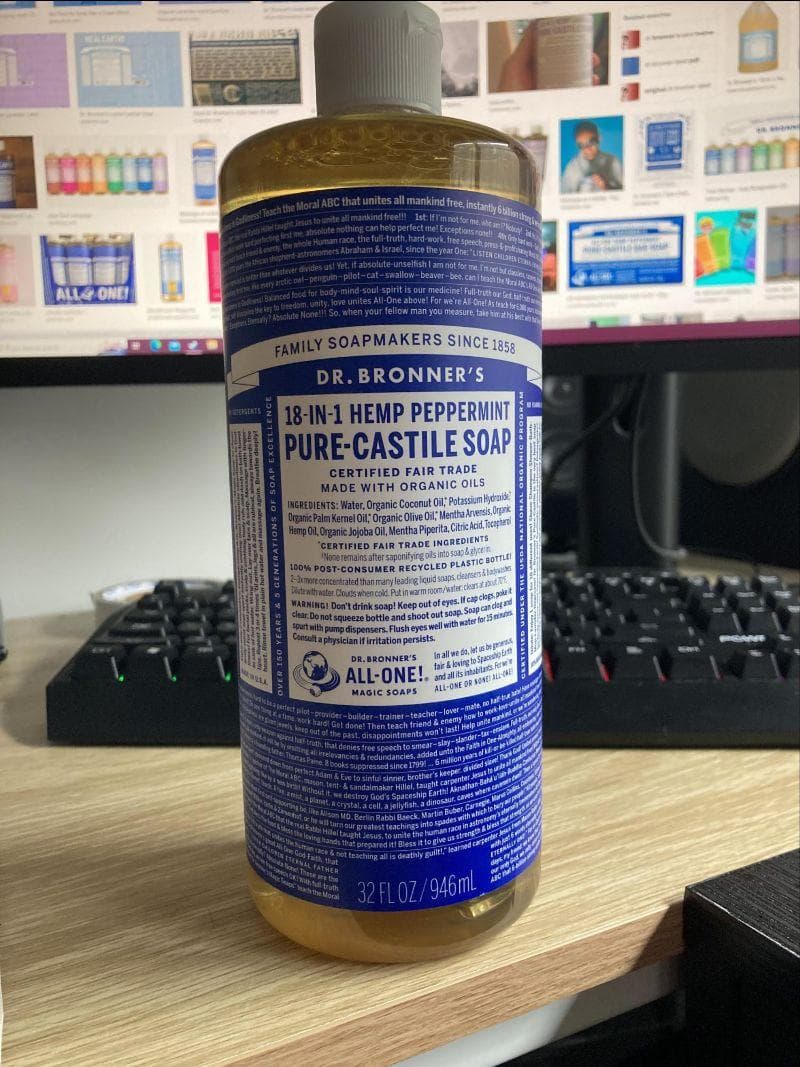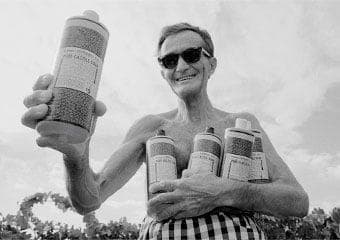Dr. Bronner's Magic Soaps
Bronwyn Rideout (October 10, 2022)
Part 1: The myth, the man, the label
Newsletter readers and podcast listeners have probably picked up by now that my errand run takes me into stores and up aisles that many skeptics wouldn't tread (unless you are Mark Honeychurch). For every bit of silliness, such as ceremonial cacao and at-home hormonal tests, the local organic shop has also been a reliable stockist of feminine hygiene products and long-lasting cleaning products that, until recently, were unavailable in normie New Zealand supermarkets. One such product that I've always kept under the bathroom sink is a bottle of Dr. Bronner's Peppermint Soap. If the name doesn't sound familiar, then maybe you know its infamous blue and white label:

I assure you it's a thrilling read, and I've long been keen to learn more about this hippie staple and whether the label was an artifact of its 60s and 70s counterculture roots. While the company has long since strayed from the spiritual platform Dr. Bronner intended, it remains politically active in the US.
The Man
Emanuel Heilbronner was born into a Jewish soapmaking family in 1908. He had two sisters, but he was expected to carry on the family business. His father was a strict authoritarian and often clashed with Emanuel regarding the latter's politics, particularly in promoting a Zionist state.
Emanuel migrated to the US in 1929, seeking the freedom to express his political opinions. He first worked for soap companies on the East Coast, before moving to Milwaukee to join other relatives. In protest at the growing popularity of the Nazi party (and out of fear of spreading persecution), Emanuel dropped the Heil from his surname, becoming simply Bronner. It was also at this time that Bronner began sending telegrams to then President Franklin D Roosevelt with his nascent thoughts on spaceship earth, the Moral ABCs, and how to end WWII.
Bronner married Paula Wolfahrt, a Catholic (and illegitimate daughter of a nun), in 1933, and they had three children; James and Ralph, who would inherit the company, and Ellen who would spend much of her adult life institutionalised or in hospitals. Paula was also described as sickly, and died prematurely in 1943. However, Bronner had a habit of describing hospitals as concentration camps, and would merge his wife's cause of death with that of his parents. Bronner continued to work as a consultant for soap companies in the midwest of the United States, but became increasingly worried about the worsening situation for Jews in Germany. He was able to bring one sister to America (who would go on to get a PhD) while the other left for a kibbutz in Palestine; but his father refused to leave Germany. Eventually, the family factory was nationalised by the Nazis, and both of Bronner's parents died in the concentration camps between 1942 and 1944.
Paula's death was a turning point for Bronner. Bronner focused his energy on his effort to save mankind, and was proud to say that he was willing to sacrifice his kids to unite the world. To this end, he would leave his children in a series of orphanages and foster homes of varying quality throughout much of their childhood and teenage years. He would also begin using the Dr moniker, and while he did attain a masters degree, there is no evidence that he earned a Doctorate like his sister had.
Throughout the 1940s, Bronner would telegram the President and the FBI, claiming that his children and his (alleged) cousin, scientist Albert Einstein, were surrounded and suppressed by communists. He would also claim that the communists were poisoning America's water via fluoridation. Bronner's beliefs in world unification also made him some strange bedfellows, including one Fred Walcher/Walker. Walcher was a friend of Bronner, and was so inspired by Bronner's plan that Walcher was voluntarily crucified in Chicago as a means to garner attention for his plan. Bronner used the short-lived publicity to distribute copies of his plan. Ironically, further investigation into Walcher found that he was sympathetic to a US Nazi group called Bund.
Bronner's activism would come to a head in 1946. He was at the University of Chicago and attempting to organise students when he was arrested for refusing to leave the Dean's office. It is believed he was ranting intensely about fluoridation. He was committed to a mental hospital in Illinois and underwent shock treatments, which he claimed caused him to go blind. He escaped while on day leave with his sister, and made it to LA where he started his own soap company using the family recipes that he remembered. Coincidentally, he ran into his friend Walcher when he arrived, and it was Fred who gave Bronner the money to buy his first ingredients.

Despite his anti-communist stance, and distaste for Marijuana, his message of peace and unity (as well as the really trippy label) made him popular with the growing counterculture scene in San Francisco. Both sons joined the family business, with James taking care of the corporate side while Ralph took on the promotions and sales side. James' wife Trudy, and later their children Dave and Mike, also came into the family business, and remain there to this day. Dr. Bronner and his children have all since passed: Ellen in 1987, Dr. Bronner in 1997, James in 1998, and Ralph in 2015
The Philosophy
While Bronner was Jewish, he was not devout, and did not raise his children in the same faith. Bronner was, however, religious and believed that all religions in the world should unite as one. His so-called Moral ABC (note: clicking the link will download a pdf) can be boiled down to a basic message: If humans can put aside their cultural and religious differences, we can live in peace on spaceship earth.
If you don't want to buy the bottle, you can read the original text here.
The Soap
Traditionally, castile soap is olive oil-based soap that was mass-produced in central Spain in the Middle Ages. Modern manufacturing uses a variety of vegetable oils, with coconut being the most common as it is less costly than other oils and keeps the product vegan-friendly. While Castile soap is an effective multipurpose cleaner, it must be diluted for use as it has a high pH and can dry the skin with prolonged contact. It's also not that great with hard water, and will form deposits on tubs and in showers.
Hence, Dr. Bronner's provides a handy dilution guide (or as the label reads: DILUTE! DILUTE! OK!) for each of the baseline 18 uses for the soap which include: washing your face, body, hands and hair, to bath, shave, brush your teeth, rinse fruit, clean dishes, do laundry, wash windows, mop floors, scrub toilets, control dust mites, kill ants and aphids, aromatherapy and even wash your dog. While it washes away dirt, it is not antibacterial.
Use as a contraceptive douche was removed from the list years ago, but some reviewers have tried using it for feminie hygiene And unsurprisingly its use as a toothpaste does not get high rankings from reviewers. The company does offer a more familiar toothpaste now, but sadly it is fluoride-free.
The company underwent rebranding in 1999 to present the company as more socially responsible and natural. James' son, the Harvard graduate David, joined at this time and was tasked with the decision of whether to declare the presence of an undisclosed ingredient, caramel colouring, or remove it and draw the ire of hippies everywhere. He experimented with hemp oil and found that not only did it sustain the colour, it also improved the lather. Disaster was briefly averted, and David secured a stockpile from Canada - but a few months later the Bush administration outlawed most hemp products. Bronner sued the Drug Enforcement Administration in federal court, and won his case.
Next week I'll take a deep dive into the company, its operations, and whether it still adheres to Emanuel's ethos.
